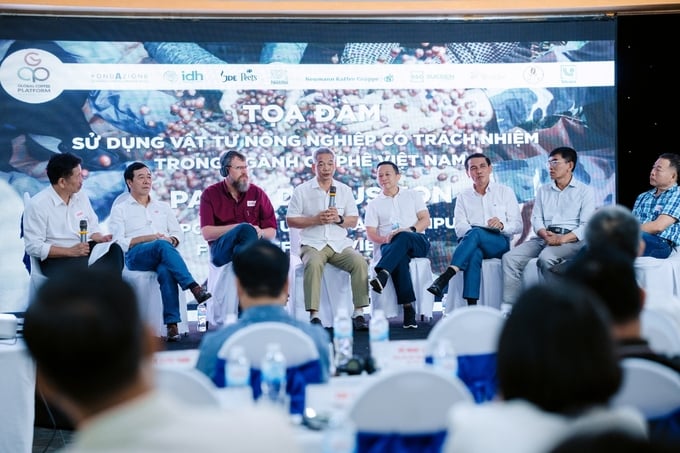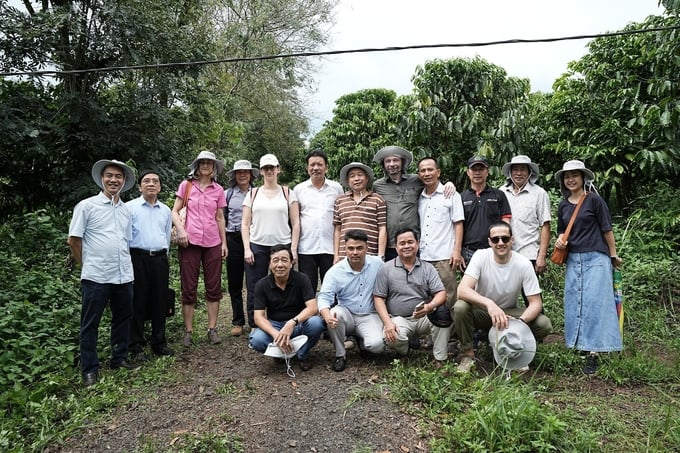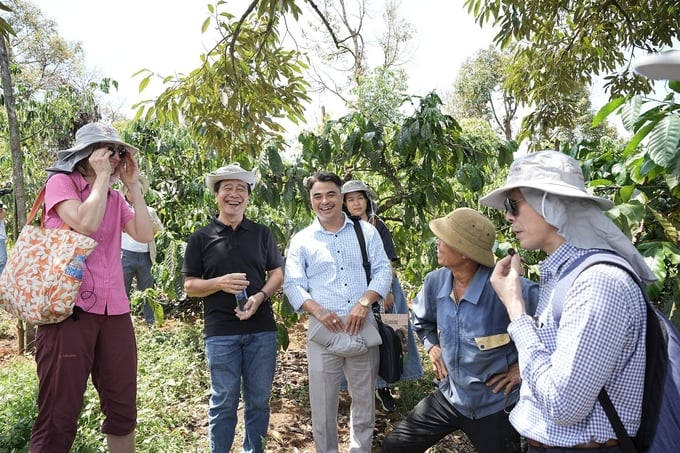June 19, 2025 | 00:35 GMT +7
June 19, 2025 | 00:35 GMT +7
Hotline: 0913.378.918
June 19, 2025 | 00:35 GMT +7
Hotline: 0913.378.918

Multi-stakeholder panel discussion on responsible use of agro-inputs in coffee production in Vietnam, held in Dak Nong province. Photo: GCP.
The Global Coffee Platform (GCP), a multi-stakeholder membership association that promotes the coffee industry's long-term development, is currently implementing several programs and activities to promote sustainable coffee production in Vietnam, including the Collective Action Initiative on "Responsible Use of Agro-Inputs for Coffee in Vietnam" (CAI).
The primary goal of this Initiative is to provide recommendations and instructions to farmers on how to use agro-chemicals responsibly and ecology-friendly, thereby contributing to the sustainable development of the Vietnam's coffee sector.

The GCP recently hosted a multistakeholder panel discussion on "Responsible Use of Agro-inputs for Coffee Production in Vietnam" with representatives from relevant agencies at the central and provincial levels, as well as relevant actors in the coffee industry (roasters, traders, input suppliers, international organizations and GCP members, farmers, etc.).
The event aims to share the results and lessons of the Initiative, which has been implemented in the Central Highlands over the past four years. The Initiative’s activities focused on promoting sustainable coffee production practices through improved weed management and responsible use of agro-inputs that meet importing coutries’ regulatory requirements, boosting farmer income and protecting the environment. In addition, the Initiative aims to raise farmers' awareness of weed management in coffee production and limit the use of pesticides, with an emphasis on glyphosate-containing herbicides; and raise public awareness regarding the importance of responsible agricultural waste collection and management.

The panel discussion also provided an opportunity for key departments and actors in the coffee production and supply chain to exchange opinions and deliberate on current issues and challenges in strategic planning and management of coffee production. Subsequently, stakeholders can identify long-term solutions to ensure sustainable coffee production, economically, socially, and environmentally. Additionally, particular attention was dedicated to meeting the hygiene and food safety requirements of major and traditional markets, notably those governed by strict and demanding standards such as the EU.
The panel discussion further explored the values and effects of collective action and pre-competitive approach advocated by GCP within the coffee industry. Accordingly, GCP aims to optimize scarce resources while mitigating risks.
Translated by Nguyen Hai Long
![Turning wind and rain into action: [9] Digitizing hydrometeorological data in response to climate change](https://t.ex-cdn.com/nongnghiepmoitruong.vn/608w/files/news/2025/06/17/z6704423696987_15fd32ffc26d590d204d520c9dac6786-nongnghiep-165943.jpg)
(VAN) Farmers have begun accessing hydrometeorological applications to adjust their cropping schedules, aiming to ensure productivity and adapt to climate change.
![Turning wind and rain into action: [8] Real-time salinity detection and early warning technology](https://t.ex-cdn.com/nongnghiepmoitruong.vn/608w/files/news/2025/06/17/z6704423696987_15fd32ffc26d590d204d520c9dac6786-nongnghiep-151127.jpg)
(VAN) Thanks to the integration of modern hydrological-hydraulic models, remote sensing technologies, and artificial intelligence, the accuracy of hydrological forecasting has significantly improved.
![Turning wind and rain into action: [7] Early disaster warnings help marine farmers minimize losses](https://t.ex-cdn.com/nongnghiepmoitruong.vn/608w/files/news/2025/06/17/z6704423696987_15fd32ffc26d590d204d520c9dac6786-nongnghiep-142942.jpg)
(VAN) In recent years, thanks to early disaster warnings and forecasting, marine farmers in Khanh Hoa province have been able to reduce risks and losses, thereby improving production efficiency.
![Turning wind and rain into action: [6] ‘Four on-the-spot’ disaster management software](https://t.ex-cdn.com/nongnghiepmoitruong.vn/608w/files/news/2025/06/17/e5a48259d6a262fc3bb3-nongnghiep-183800.jpg)
(VAN) By simply activating the scenario on the disaster management software, the relevant authorities immediately know how many households need to be evacuated, where to evacuate them to, and by what means of transportation…
![Turning wind and rain into action: [5] Hue applies modern technology in disaster forecasting](https://t.ex-cdn.com/nongnghiepmoitruong.vn/608w/files/news/2025/06/17/z6704423696987_15fd32ffc26d590d204d520c9dac6786-nongnghiep-093938.jpg)
(VAN) In Hue city, modern technology has recently been applied in meteorological and hydrological forecasting and warning, helping to reduce the damage caused by natural disasters.

(VAN) A cutting-edge farming technique being implemented on an experimental ranch in Arizona's Sonoran Desert has already saved a billion gallons of water over five years, according to Civil Eats.

(VAN) Poultry and pig production and the environment can be boosted through enhanced water technology, according to new research.